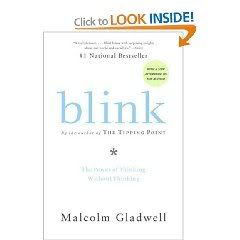Blink: The Power of Thinking Without Thinking
Best-selling author Gladwell (The Tipping Point) has a dazzling ability to find commonality in disparate fields of study. As he displays again in this entertaining and illuminating look at how we make snap judgments—about people's intentions, the authenticity of a work of art, even military strategy—he can parse for general readers the intricacies of fascinating but little-known fields like professional food tasting (why does Coke taste different from Pepsi?). Gladwell's conclusion, after studying how people make instant decisions in a wide range of fields from psychology to police work, is that we can make better instant judgments by training our mind and senses to focus on the most relevant facts—and that less input (as long as it's the right input) is better than more. Perhaps the most stunning example he gives of this counterintuitive truth is the most expensive war game ever conducted by the Pentagon, in which a wily marine officer, playing "a rogue military commander" in the Persian Gulf and unencumbered by hierarchy, bureaucracy and too much technology, humiliated American forces whose chiefs were bogged down in matrixes, systems for decision making and information overload.
I often hear an interview with an author or read a review of a book that sounds terrific, only to learn when I read the book that I learned about all I need to know from the interview or review. Unfortunately BLINK fits that category although Mr. Gladwell does make some interesting observations that fall into the sad, the fascinating and the obvious.
It is sad, for instance, that in the year 2005 we are still programmed by racial stereotypes when we blink. The shooting of Amadou Diallo is an unfortunate example. Police officers see a small black man on the street after midnight in a bad neighborhood in the Bronx. When they drive by him he does not run. Then he finally runs, attempting to get into his apartment and reaches for somethig that turns out to be a billfold. We know how this incident ended. Mr. Gladwell goes into great detail to explain all the mistakes that the polices officers made. For instance, if they had paid attention to his face they would have seen that he was frightened rather than dangerous. It is incredibly sad that in an experiment where black college students, when given twenty questions taken from the GRE, the standardized test for admission to graduate school, if asked to state their race on a pretest questionnaire, the number of questions they would get correct is cut in half, they are so programmed by negative racial stereotypes. (Congressman John Lewis has spoken out recently on racial profiling at airports.)
Some of Mr. Gladwell's facts are fascinating. Shoppers will pay more for the same amount of ice cream if it is packaged in a round rather than a rectangular container, for instance. Then there is the Pepsi v. Coke taste test. Fanatics swear they can tell the difference, and many drinkers can. However, if you do the triangle test, where you put the same cola in two glasses and the other in the third glass and ask a thousand samplers to tell you which two colas are the same, only about a third of the testers gets it right. That, according to the author, is not much better than chance, so we might as well guess.
Many of the author's observations and conclusions are obvious: what he calls the Warren Harding error-- that we often vote for attractive political candidates regardless of their qualifications; and that tall white men get promoted over black men, white women, black women and short white men; and that blinking or "thin slicing" is more accurate if it involves something we care about and are good at, i.e., we have experience in the area. He gives example after example of this: the psychologist who through years of study can predict from a short interview with a young couple- even if they are just discussing a pet-- if they will get a divorce down the road; the art critic who spotted an expensive fake immediately because she had studied ancient sculpture, the seasoned tennis pro who can predict when tennis players will miss their second serve.
The Seventeenth Century philosopher Pascal is way ahead of Mr. Gladwell since he said something similar a long time ago: chance favors the prepared mind.


